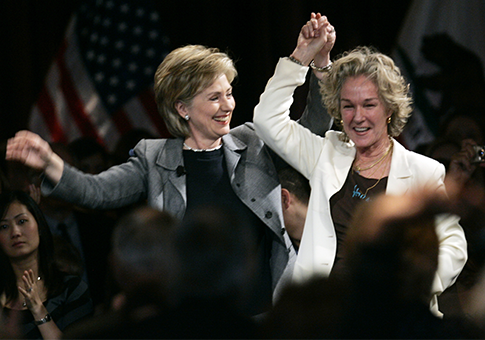The Ready for Hillary Super PAC has signed on famed Democratic fundraiser Susie Tompkins Buell, who co-founded clothing line Esprit in 1968.
Esprit ran into trouble in the 1990s when it was targeted by the Clinton administration.
While the company was under Tompkins Buell’s control in 1994, the Department of Labor raided three San Francisco garment contractors that manufactured clothing for Esprit.
It was found that the contracted shops were doctoring payroll records, and paying their workers only $3.75 an hour without overtime. The minimum wage at the time was $4.25.
At the time of the raid, one of the shops working for Esprit owed its workers $127,000 in back wages.
The Department of Labor held that responsibility fell on the company to make sure that whoever is making its clothing is following the law.
"Clothing manufacturers are responsible because the garment workers are sewing garments that belong to them," said Harry Hu, a DOL investigator at the time.
Esprit also did not fully comply with the government’s demands during its investigation.
The DOL asked Esprit to cease shipping goods that were produced by the shops under investigation, but the company refused.
"We don’t agree with what Esprit is doing right now," Hu said at the time. "We want Esprit and other manufacturers not to ship the goods, but they ship them anyway."
Although Esprit saw itself as a "socially responsible" company, it defended its use of cheap sweatshop labor.
"The bottom line is Esprit has to pay its own workers a fair wage. Do you think a socially responsible business would survive if it would pay twice as much to its contractor? How can a company stay in business?" said spokesman Dan Imhoff.
Tompkins Buell did her best to cover Esprit in a veil of social responsibility as well.
Esprit created an $8 million ad campaign asking its customers to finish the sentence "If I could change the world, I’d…" the same year the sweatshops hired by Esprit were raided.
Yet this is not the only case of worker abuse by Tompkins Buell’s Esprit.
In 1972, Esprit came under fire from the National Labor Relations Board (NLRB) when it "threatened, harassed, and intimidated the workers" at its own San Francisco garment factory because approximately 100 employees who worked for the company attempted to unionize.
Esprit shut down the plant before the workers could organize.
The NLRB ordered Esprit more than 10 years later to pay out $1.2 million in back wages to the abused workers that could be tracked down.
